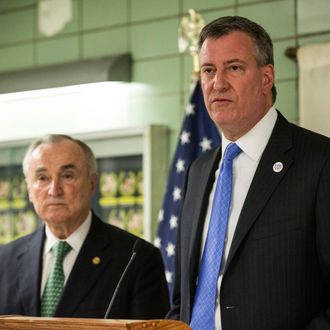
The City Council speaker thinks New York needs to hire 1,000 more police officers. The mayor says we’ve got plenty right now, thanks. It’s the first significant, substantive policy clash between Melissa Mark-Viverito and Bill de Blasio.
And one big reason it will be a rare point of contention as the Council debates the mayor’s first budget is that nobody knows the right answer.
Any police commissioner wants as many officers as he or she can get: More personnel means more flexibility in deploying them. Yet for all the sophisticated data analysis used by modern police departments, no one has ever been able to calculate the magic number of cops per capita needed to keep crime low.
“We don’t have any idea where the thresholds are,” says George Kelling, the criminologist who became famous as the co-creator of the “broken windows” theory of policing adopted by Bill Bratton during his first run atop the NYPD. “While I’d be hard-pressed to ever recommend a reduction in the number of police,” Kelling says, “it seems to me that once you pull crime down quite a ways, you’ve begun to change how people are behaving. It doesn’t mean that when you begin to withdraw the level of policing that they’re necessarily going to go back to the old patterns. Although we don’t know.”
No wonder even the experts are confused. Chicago has one cop for every 226 citizens, a lower ratio than New York, but higher crime rates; meanwhile, in Miami, crime dropped for a decade even as the force shrunk to one cop per 400 residents.
In New York’s bad old early ‘90s, when homicides peaked at 2,245, Mayor David Dinkins scrambled to add thousands to the NYPD head count. The new hires couldn’t arrive fast enough to save Dinkins politically, but the city — and Mayor Rudy Giuliani and Bratton — reaped the benefits.
Yet the NYPD head count has been shrinking ever since 2002, when it peaked at nearly 41,000. Last year, during the mayoral campaign, Bratton declared that the force of 34,500 was “too small.” Since being appointed commissioner, though, he’s claimed to be “comfortable” with the number, perhaps in deference to the budget priorities of his new boss, de Blasio.
Kelling isn’t so comfortable. “It could be that cities can get by with fewer police,” he says. “At the same time, it’s an experiment I’m quite nervous about.” The key, Kelling believes, is how deftly a department uses its thinner ranks: With fewer bodies available, are cops removed from foot patrols in order to cover more ground in cars? That would be a dangerous mistake, he says. “The smaller the department becomes, the harder it will be to maintain a felt presence of police,” Kelling says. “And that kind of felt presence explains at least part of the reduction in crime we saw during the late 1990s and since.”
De Blasio, of course, believes that minority neighborhoods felt too much of a police presence, through the overuse of stop-and-frisk, and that better bonds between cops and community will be even more effective. Kelling, who has come out of retirement to again advise Bratton, is all for cooperation, but he’s keeping a keen eye on the numbers as well as the tactics.
“The last real research on the relationship between the number of police and the impact on crime was done in the ‘60s and ‘70s,” he says, and crime-fighting strategies have changed drastically since then. “I know of nothing going on to update that research. Though there are some interesting natural experiments going on in Camden, in Detroit, and now what’s happening in New York.” Just as long as things don’t get too interesting around here.





























